The sense that is common to one generation is uncommon to the next[...]The only sense that is common, in the long run, is the sense of change--and we all instinctively avoid it, and object to
the passage of time, and would rather have none of it.


The summer after graduating from college, I was offered a teaching position in Tokyo. With an ostensibly useless English degree, I embraced the opportunity for a real, well-paying, professional job. There was even a contract involved.
Packing for the year was tricky, but I needed the essentials:
- English-Japanese dictionary. Check.
- Map of the Tokyo subway lines. Check.
- Culture Shock! book on ex-pat life in Japan. Check.
- Chopsticks. Ch- Wait, they probably have plenty of those in Tokyo...
The knee-jerk reactions filling my liberally-educated, 22-year old mind managed to stop short before escaping my lips, twitching in silent disgust. I momentarily felt grateful that my tattoo was in Sanskrit, not Kanji, feeling fairly certain that he held nothing against Hindus.
Although, when he saw the aum etched into my skin, he asked with slight confusion if it was the number '30,' no doubt questioning its significance. I smiled and nodded ambiguously; it was easier than teaching him yoga.

I quickly pondered which 21st century sensibility his question about the 'Japs' offended the most, ready to aim and fire. Ultimately, though, my inner yogi opted for the peaceful path of least resistance.
"Yep," I flatly replied in the best country Vermont dialect I could muster from childhood.
Ahhh, taking the higher ground can be so self-satisfying.
Did he have any idea how much Japan had changed in nearly six decades?

After eavesdropping on the brief exchange, my mother pulled me aside, out of hearing aid-shot, and whispered, "He doesn't see this opportunity from your perspective. His brother was in the Second World War and they both lost friends in Pearl Harbor."
I nodded knowingly at the familiarity of this story, resisting the urge to roll my eyes. Geriatrics often get excused in the same way that small children do, as though unaccountable for their words and actions.
Then she quoted her favorite Robert Frost line: "I never dared to be radical when young for fear it would make me conservative when old."
But my grandfather was simultaneously both radical and conservative. During his later years, he was outdated on both ends: trapped in a mid-20th century time warp on some issues, yet far ahead of his time and contemporaries on others.
As a justice of the peace, he oversaw several civil unions, some even in his own backyard! Also, he had a bumper sticker which read, "Take Vermont Forward" in response to the anti-gay backlash across the state when the civil union bill was passed. Few people were politically more progressive than he in regards to this issue.
Well, except maybe Ben and Jerry, who re-named an ice cream flavor in honor of civil unions in Vermont.
In the aftermath of heated political debate regarding gay marriage, Vermont blazed a human rights trail at the turn of the millennium and my octogenarian grandfather was on the vanguard.
The unique and extreme inconsistency of his beliefs baffled and somewhat amused me. If the kamikazes were gay, would he also be homophobic? My mother jokes that he had selective hearing, so it isn't a stretch to think that he could also have selective bigotry.

I felt relieved to discover that this kind of arbitrary and often self-contradictory discrimination was not unique to one generation, my family or even my 'homeland'. On the other side of the globe, I encountered many elderly Japanese with mixed responses. Once I noticed the occasional ojiisan (grandpa) glaring at me while bringing his grandchildren to McDonald's. Perhaps he was from Hiroshima? Maybe he resents that American fast food is so addictive?
Also, my father called me regularly during my stay in Japan and, despite his education and world travels, he nonetheless asked about my experiences with "Orientals". I reminded him, to no avail, that Oriental is best used to describe rugs.
I began to see a trend and wondered in what ways I will offend future generations in the future with acceptable, or even progressive, views I hold today.
My grandparents referred to something thrown together as "Gerry-built"; to my parents' generation, it was "Nigger-rigged"; to my cohorts and me, that same thing is "poorly constructed". The next generation may somehow find that derogatory and create yet another, more appropriate term. We're all speaking the same language, but along the way and over the years, something got lost in translation.

No comments:
Post a Comment